AMD's 65nm Preview Part 2 - The Plot Thickens (Updated with Information from AMD)
by Anand Lal Shimpi on December 21, 2006 12:12 AM EST- Posted in
- CPUs
Gaming Performance & Power Usage
Quake 4 was the first application that really showed us the performance penalty you incur when moving to Brisbane, in this case the older core is about 4% faster. If you take into account that we're looking at performance at 1600 x 1200 with a GeForce 8800 GTX, in more GPU limited situations you're unlikely to notice the performance difference, but at more CPU limited situations the delta could likely grow even larger than 4%.
As the Core 2 processors are pushing much more data to the GPU than their competitors, average power consumption is generally much higher - it's the expense of greater performance in this case. The performance per watt charts take into account both factors and give you more of a breakdown of efficiency. Despite the decrease in performance, the reduction in power consumption gives the new Brisbane cores the efficiency advantage over most of their predecessors.
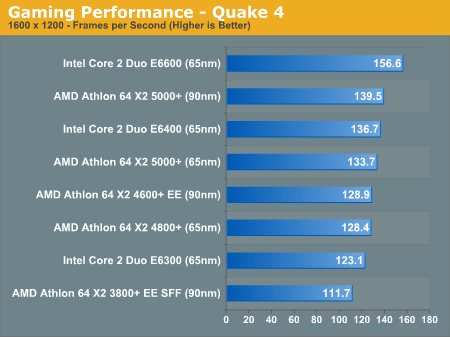
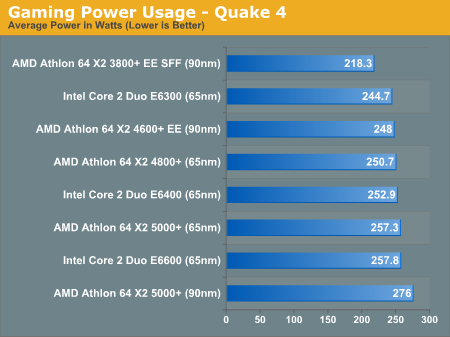
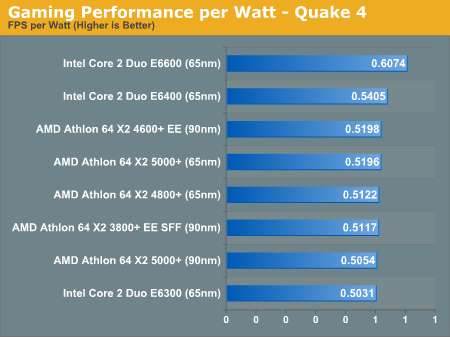
Oblivion didn't show a real impact in performance due to the slower Brisbane cores, but it clearly favors Intel's Core 2 architecture over AMD's.
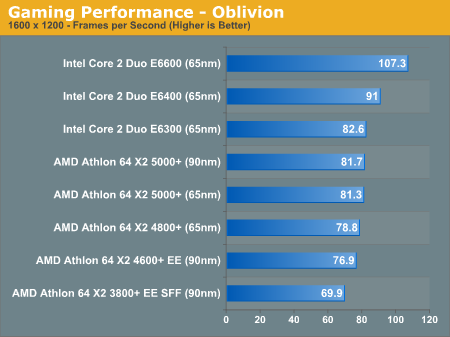
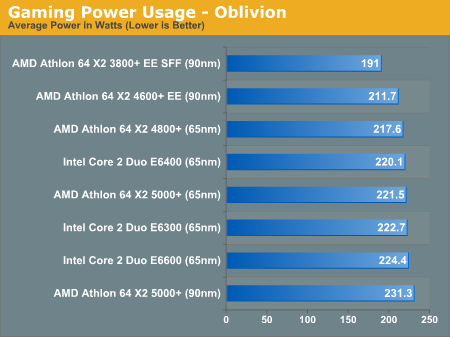
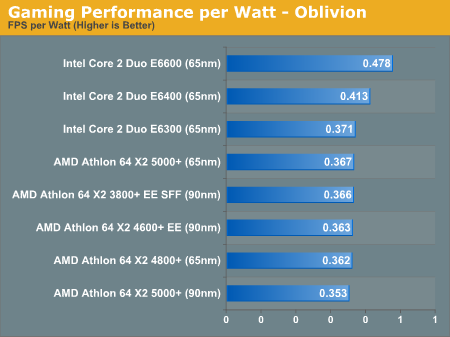










52 Comments
View All Comments
Schugy - Thursday, December 21, 2006 - link
Being able to sell more chips is not an argument for consumers but for AMD. Brisbane is not like Prescott - AMD has done a good job. Further development is needed but first 65nm units are running and are the basis for new architectures with increased transistor count.Yoshi911 - Thursday, December 21, 2006 - link
Hey all, I know that Socket 939 is obselete now but I think It'd be awesome if they'd make a 939 65nm core.. I still have my Opteron 144 at 3.1ghz on my Lanparty board and would love to see a core I could update to before the nextgen AMD achatecture makes it out.Anyone know if this is a possibilty??
Spoelie - Thursday, December 21, 2006 - link
get a 165 for 150$, overclock it to at least 2.8ghz and you have fx62 like performancethat's the best thing you will ever get on socket 939 I'm afraid, now and in the future.
peldor - Thursday, December 21, 2006 - link
Practically, it's never gonna happen. The market wouldn't be worth the effort.OcHungry - Thursday, December 21, 2006 - link
I don’t understand why anyone or any review expect stellar overclocking or performance from these 65nm’s?Did AMD promise any? No. AMD promised a transition to 65nm and on time. That’s what we all should expect and appreciate the successful transition.
Do you remember the first batch of Intel's 65nm Core 2’s? It was not as good as what you see today. Frankly I think AMD did much better in 65nm than Intel back then, and this first release is giving Core 2 due's matured chip a run for the money. After all the review here clearly shows AMD is on tract w/ 65nm’s performance per watt and energy consumption. Don’t forget its still K8 architecture competing w/ the latest and the greatest of Intel's.
IntelUser2000 - Thursday, December 21, 2006 - link
Which first batches?? The ones XS has been receiving far before the official Core 2 Duo release?? What's the OC that AT got??
http://www.anandtech.com/cpuchipsets/showdoc.aspx?...">http://www.anandtech.com/cpuchipsets/showdoc.aspx?...
X6800 went from 2.93GHz to 3.6GHz with default voltage. On a very good air cooler and voltage increased, it reached 4.0GHz.
E6700: 2.667GHz to 3.4 default, 3.9 highest
E6600: 4.0GHz highest
X6800 stock cooler highest: 3.4GHz
Tomshardware: X6800 to 3.46GHz
Xbitlabs: X6800 to 3.4GHz, 3.6GHz with +voltage
Brisbane 5000+
2.6GHz to 2.925GHz, on stock cooler, 1.475V.
It's not that bad for Brisbane IMO. It seems more like an architectural limitation than process or thermal limitation. Core 2 Duo still has ways to go and roadmaps sort of reflect it. Though the increase in L2 access latencies may mean it was done to increase the clock speed potential.
peldor - Thursday, December 21, 2006 - link
Going to 65nm shouldn't move you backwards in performance though. There's no excuse for that from the consumer's POV unless the price also goes down (certainly a possibility if yields are good).ydoucensor - Thursday, December 21, 2006 - link
could the increase in latencies have something to do with "trusted" computing and the need for attestation?fitten - Thursday, December 21, 2006 - link
Pure speculation, but the L2 latency increase may be a result of work going into the three level cache controller logic getting ready for K8L or whatever it's going to be.mino - Thursday, December 21, 2006 - link
My thoughts exactly.